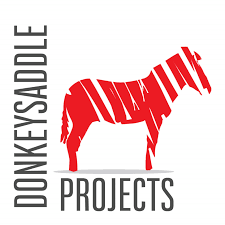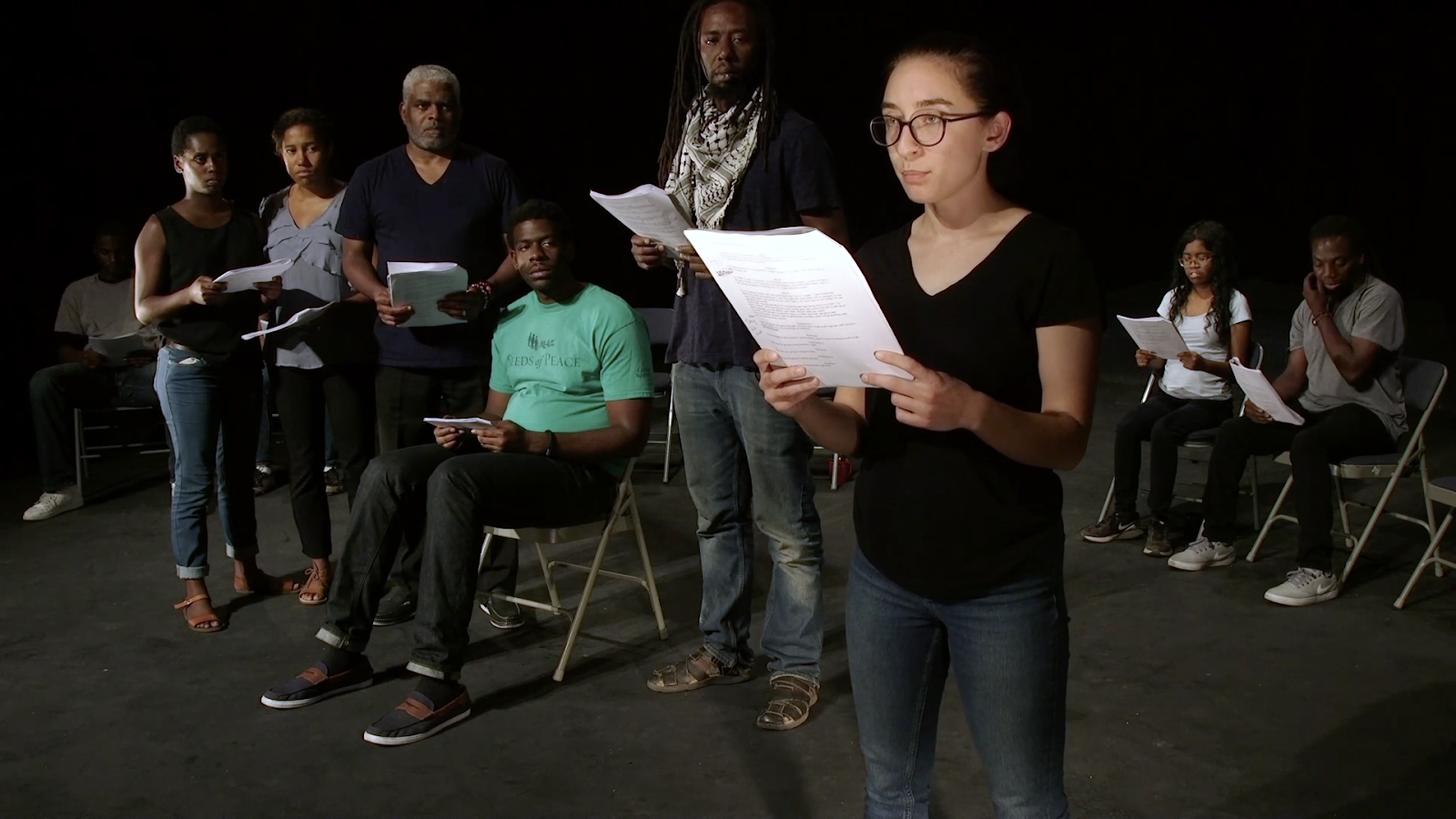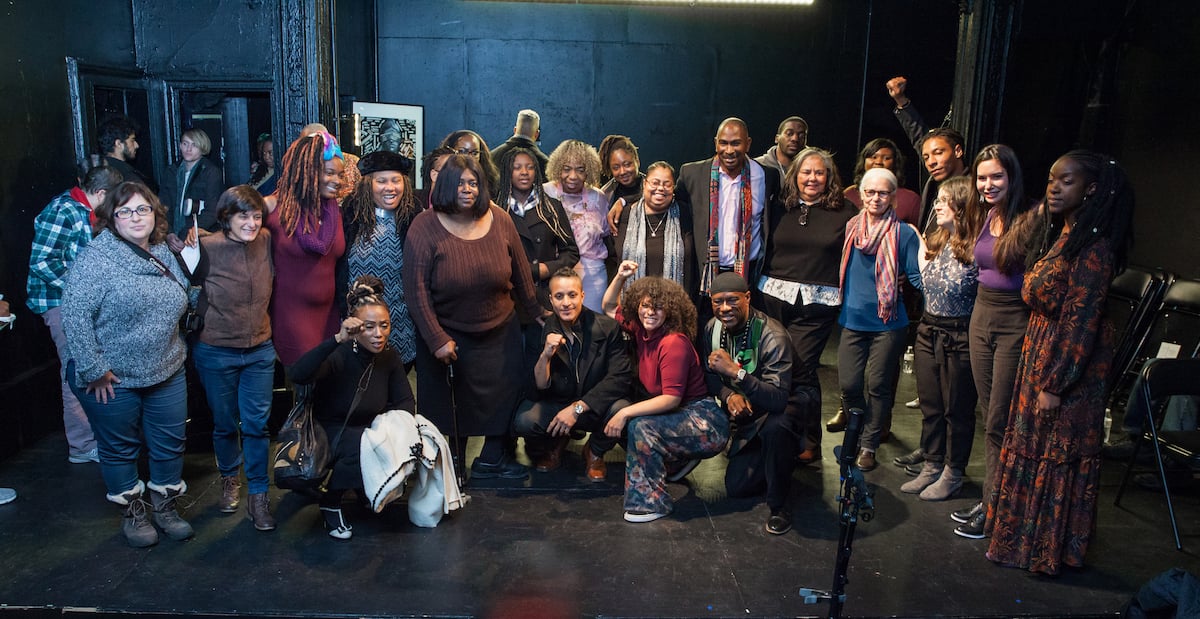Member Spotlight: Donkeysaddle Projects
Donkeysaddle Projects is hard to pin down. It’s an art collective and a group of organizers working locally and globally. Donkeysaddle Projects creates plays and films; its members organize events and create environments for participatory co-creating. The Donkeysaddle Projects team has experience in journalism, poetry, theater, community organizing, social justice education, and human rights activism.

But even though its output is wide-ranging, it is all bound by a cohesive mission. Donkeysaddle Projects believes “ in the power of art and storytelling to bring about change through communal political education and movement building. The Donskeysaddle Projects team hopes to challenge injustice in all its manifestations, to connect movements, and to nurture radical imagination.”
The Donkeysaddle Projects team shares an in-depth look at their work, including the ways that they are meeting this moment–an intersection of anti-racist uprising and a global pandemic.
Donkeysaddle Projects was founded in 2008. We'd love to hear more about your origin story. How has the work evolved since then, artistically or directionally?
Donkeysaddle Projects (DSP) started out in 2008 as the umbrella organization for Jen [Marlowe]’s writing and documentary films. DSP has since grown into a small but dedicated team of grassroots organizers and artists committed to ending systemic structural violence in all its forms, including law enforcement, the prison-industrial complex and the death penalty, and the ongoing genocides of indigenous peoples across the Americas, the African continent, Palestine and the Arab world. An organic shift in DSP’s structure and identity happened during the evolution of DSP’s work around Jen’s play, "There Is a Field.”

Reading "There Is a Field"
"There Is a Field" allowed DSP to partner with a wide spectrum of artists and activists. The heart of the project was rooted in intentional movement building, with performances and artistic residencies in various cities that combined theatrical production, storytelling, political education, and cross-movement solidarity. As Jen partnered with different individuals and organizations on "There Is a Field", and then other DSP projects, it seemed only natural for many of them to join the DSP team, either as program managers, members of the advisory board, and/or creative partners. This organically led to DSP becoming something in between a community and a collective.
Donkeysaddle Projects has been fiscally sponsored by Fractured Atlas for nearly as long as it’s been around! How has fiscal sponsorship been a valuable tool for your creative work? What made you decide to go with fiscal sponsorship instead of incorporating as a nonprofit?
Incorporating as a non-profit would have required the kind of rigidity and structural rigor that a genuinely grassroots team built on trust can do without. At the same time, we needed a fiscal sponsor because, (though “the revolution will not be funded” and our work is a labor of love) our projects come with expenses. Fractured Atlas’s fiscal sponsorship has facilitated funding from multiple foundations over the years, including Rockefeller Brothers Fund, Fund for Nonviolence, Emergent Fund, McMillan-Stewart Foundation, and others. In addition, DSP deeply appreciates Fractured Atlas’ commitment to anti-racism and anti-oppression work and has benefited numerous times from consultation with Fractured Atlas team members over the years! We absolutely feel that Fractured Atlas is a valued partner in our work!
You’ve collaborated with many survivors and activists directly impacted by state violence, in many different capacities. Tell us about the people of Donkeysaddle Projects, as individuals and collaborators.
A core principle of Donkeysaddle Projects is to uplift the stories, voices and resilience of those most impacted by state violence. This is best accomplished when the DSP team members/participants themselves are also from these impacted communities. We are individuals with various cultural backgrounds, from different parts of the world, who connect through our remarkably similar experiences of state violence, and our shared love and appreciation for the power of art as a vehicle for truth.
Our work is deepened by a diverse group of partners who have expertise specific to each project. The Movement for Black Lives, Adalah Justice Project, Highlander Center, Witness to Innocence, Dream Defenders, Mamie Till Mobley Memorial Foundation, Amnesty International, Students for Justice in Palestine, the People’s Forum, Eagle Project, First Nations Theater Guild, Just Vision, and the Center for Constitutional Rights are just some of our past and current partners.
We especially strive to include as many directly impacted people as feasibly possible with each project. Those who are at the heart of the struggle contribute as participants, performers, speakers, organizers, and/or facilitators. This group evolves based on the type and location of each project. Collaborators include formerly incarcerated individuals and death row exonerees, survivors and family members affected by lynchings and police murder, Palestinian refugees in the U.S. and abroad, Indigenous artists here on Turtle Island (the U.S.), Zimbabwean theater makers, Northern Ireland civil rights activists, Southern Sudanese musicians, and more.
What do you hope people will take away from your work? What are some tools you’ve created to engage with your artists and audience? What kind of space are you hoping to create?
DSP hopes to nurture connections among different communities and social movements dedicated to liberation. We find that artistic processes serve as excellent tools to creatively engage in communal political education. Storytelling offers an entry point to discoveries of shared experience and common ground, both socially and politically. We use articles, film, theater, podcasts, and more to share these stories.
We engage our artists and creative partners in this process of political education by inviting them to facilitate workshops and events in various communities, engaging and sharpening their skills. The artists’ skills, practices, and exercises can be adopted by participating individuals and organizers to support their own work and communities. The artists also learn from the participants, who come with their own expertise and knowledge centered around the political and social focus of the work.
The performing arts is especially useful to broaden community education and expand movement building. For groups with little to no theater experiences, reading, rehearsing, and performing a script based on socio-political issues offer an opportunity for deep discussion, a creative way of learning, and a unique perspective of shared trauma, survival, and efforts toward social action and political change. The facilitators and participants form an ensemble, and learn what it means to create as an ensemble. This process supports community movement building, interpersonal relationships, and a transference of the creative experience from the art world to the political realm. We find that physical theatre based exercises (such as tableau work), and vocal exercises continually stimulate political discussion, and result in profound discoveries.
Establishing a group “ritual” among participants (like our ritual of adding to a project “scroll”, similar to a community journal) is vital to the work, as it offers a strong foundation for each project and assembles a creative bank of thoughts and intentions toward growth that are then shared with the audience at the culminating event. This current carries on from event to event, supporting audience talk-backs and immediate calls to action. It also connects the current participants and audience members to the full DSP community, as the current group can see the previous groups’ work, and add to it, supporting and sharing in a very special way that goes beyond the page.
We hope that every space we create reflects our core principles: we are guided by integrity and love, unafraid of ignorance or risk, and we are committed to justice and liberation.
As artists and activists, Donkeysaddle Projects’ work has primarily centered social justice and community mobilization. How has COVID-19 affected your direction and interim goals?
As we look around the world, it becomes very clear that COVID-19 is not the “great equalizer,” but a great exacerbator of pre-existing social injustice.
As a team, we asked ourselves what we could do, now, that would be most helpful or needed? One answer that emerged was that DSP would seek out partnerships with organizations and artists creating impactful cultural work related to critically needed coronavirus-related organizing. As part of this effort, we launched our new bi-weekly podcast called The Artivists’ Room. Though the Artivists’ Room had already been in development, we fast-tracked its launch, and sharpened its focus to elevating artist-activists on the forefront of the current crisis. We partnered with #DefendTheCriminalized (a collective in East LA) on a virtual DJ event raising funds for undocumented immigrants. We collaborated with Movimiento Cosecha (undocumented immigrants organizing for permanent protection, dignity & respect for all), on artistic elements of their May 1 campaign. We partnered with Reina Project-NY (a platform for liberation through QTBIPOC art, education, and action) on “Kiki Corona,” a virtual drag show and fundraiser for a Bronx-based mutual aid solidarity group. We co-sponsored Dunya Productions’ May 9 virtual live-reading of “Letters from Palestine in the Time of the Virus.”
DSP was also one of four organizations who produced Justice Beats, a virtual festival and fundraiser on May 30 which invited audiences worldwide to stand in collective struggle with Palestinian, unhoused, incarcerated, undocumented and Indigenous families. Hosted by the Peace Poets, Justice Beats had a fantastic line-up of DJs, musicians and wordsmiths, and raised $11,000 for 11 different frontline allies.
One core element of all the above projects: they provided participating artists some much-needed income at a time when artists’ livelihoods have been decimated–particularly artists from communities of color.
Your work emphasizes solidarity with oppressed people worldwide. How are you staying connected with your international communities? With the uprising in the aftermath of George Floyd’s murder, how has your work expanded or re-focused?
DSP has re-doubled our efforts since the start of the uprising re-ignited by the murder of George Floyd, trying to support anti-racism work in all the ways we can. We supported De’Jaun Davis-Correia (Troy Davis’s nephew) in writing a piece for Colorlines titled “After My Uncle’s Execution, I took a Break. Racism Didn’t”, co-produced a short video “Palestine for Black Lives” and wrote “Building the Seattle Bike Brigade” for Verso about anti-racist mutual aid in Seattle via bikes. We are also part of an anti-death penalty coaliton raising the alarm about the resumption of federal executions. We supported federal death row prisoner Billie Allen in writing this piece for The Marshall Project about his experience of the first federal executions in 17 years, and co-sponsored the virtual event “Art of Innocence: The People’s Struggle to Abolish the Death Penalty.”
On a day-to-day basis, how is your organization adapting to the COVID-19 situation? What has or hasn’t been working? Have there been any bright spots or unexpected opportunities hidden away in this situation?
Amidst physical distance and social isolation, we have maintained our sense of intimate community and support among our core DSP team, as well as our extended DSP community of artists, organizers, students, and donors. Our DSP team members reached out to their various networks to assess what support is needed among different communities and how we can help, and at moments, contacts and efforts and collaborations have intersected in amazing ways that we couldn’t have anticipated. During this crisis, there is an unexpected opportunity for long-term impact organizationally and across movements when various communities connect around an issue, offering mutual support in recognition of shared challenges even amidst cultural differences.
Tell us more about your current or upcoming productions! What are you hoping to accomplish with this work?
DSP’s new documentary film “There is a Field” about Black-Palestinian solidarity will premiere in Palestine on October 2, and in the U.S. on October 15. The film grows out of the play by the same name about Asel Asleh, a 17-year old Palestinian murdered by Israeli police during a protest in October 2000. Based on interviews and primary sources collected over 15 years, the play offers a uniquely personal lens for understanding inequality as the root of state violence and impunity. The film version shows "There is a Field" performed by organizers in the Movement for Black Lives, intercut with the organizers’ reflections on the parallels they see to their lived reality in the U.S, vis a vis structural racism and state violence. Visit www.ThereIsAField.movie for more info about the premiere and future screenings!
In addition, we continue work on the Vignette Collective; a storytelling endeavor that engages artists, activists, and organizers who live on Turtle Island in a cross-cultural process of collaboration and performance. Native, Palestinian, and African diasporic experiences (to name a few) are woven into stories of our diverse ancestral roots, as we create written and embodied mosaics that expose and demystify the structures of settler-colonialism, while celebrating the ways our communities are truly resilient.
DSP is also producing a powerful series of staged readings of “I Am Troy Davis,” performed by those most impacted by the death penalty and the violence of the criminal justice system, state and racial violence: death row survivors; family members of death row prisoners and wrongfully convicted people; and relatives of those killed by police and racial violence. (Troy Davis was an innocent man on Georgia’s death row, who was executed in 2011.) The second performance was planned for May 2020 in Austin, TX, but has been postponed due to the health crisis. A documentary film of the December 2019 performance in NYC is in progress, and features the late activist Airickca Gordon-Taylor (the cousin of 14 year-old Emmett Till, who was lynched in Mississippi in 1955), Sabrina Butler (exonerated from MS death row), Shujaa Graham (exonerated from CA death row), Lawrence Hayes (survivor of NY death row), Aisha Salaam (sister of Yusef Salaam, wrongfully convicted in the Central Park 5 case), Gwen Carr (the mother of Eric Garner, killed by NYC police in 2014), Uncle Bobby X (uncle of Oscar Grant, killed by BART police in 2009), Akeem Browder (brother of Kalief Browder, a 16-year-old held in Rikers in pre-trial solitary confinement who later killed himself), Ron Davis (father of Jordan Davis, a 17-year-old shot and killed in 2012 in FL), Yvette Allen (sister of Billie Allen on federal death row with innocence claims), and Delia Perez Meyer (sister of Louis Castro Perez, on TX death row with innocence claims).
Crimmigration play: DSP is partnering with immigrant organizer/activist Alejandra Pablos to develop a documentary play focused on Alé’s personal account of more than two years of detention by ICE at the Eloy detention center, providing a window into the stories of the women she met there, and how this experience shaped her ongoing struggle against her own deportation, and the wider criminalization of immigrants. The theatrical piece is based on documentary material (journals, letters, interviews), as well as Ale’s own writing, and will be used as a tool of community engagement, mobilization and education.
Is there anything you want people who are being introduced to you to know? Any advice for burgeoning “artivists” in the time of COVID-19?
We’re hesitant to give advice–everyone is facing such different, delicate realities–but we do have some reflections and perhaps words of encouragement. Despite the new norms of “social distancing,” the combination of the COVID-19 crisis and the uprising for Black lives has shown us, more than ever, the importance of community. Redistribution of resources, checking in on each other, mutual aid–these are values we now hold a new level of appreciation for, that we should not abandon in our haste to “return to normal.” COVID-19 has also confirmed that pre-existing conditions of injustice and social inequality are aggravated, not erased, at times of crisis. Prisoners, people with medical conditions, differently-abled individuals, the unhoused, the undocumented, refugees, people of color, and the elderly all face even greater risks now than they did before the pandemic. It is urgent–literally a matter of life or death–that we challenge the socio-economic and racial factors that have disenfranchised entire communities, and make sure we never go back to them.
As artists, we all play a central role in that. Our work not only reflects painful truths of our societies, but also can nurture our collective and individual imagination, so that we can envision a different future, see beyond our limitations, and walk in strong and defiant compassion for all who suffer. We can uplift and help cultivate social movements, build bridges between disparate and distant communities, soothe the soul, and inspire a healthier and more edifying course of action for our communities, especially amidst times of trauma and crisis. What is needed now, more than ever, is that we speak truth, raise our voices, and share our stories, boldly and with love.
You can follow Donkeysaddle Projects on Facebook and Twitter and support their work by donating to them on their Fractured Atlas fundraising page.
About Fractured Atlas
Fiscal sponsor, fundraising platform, educational resource, advice from a staff of experienced artists & creatives. We’re rooting for you!


